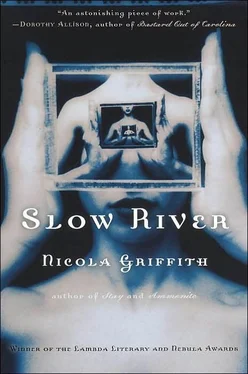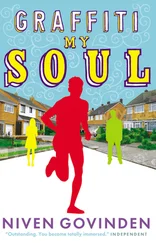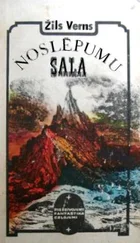All Lore understood about Spanner was that whenever Lore reached for her, she wavered and was gone, like the shimmering reflection on the oily surface of the river.
“You know what it’s like. To have someone kill herself. You know how it feels. Because of your sister, your sister…”
“Stella.” It was hard to say her name aloud. Her sister’s suicide was public property. She supposed it had been all over the net. “Who do you know that killed themselves?”
Spanner ignored her. “You know what that’s like. How hard it is to explain to people. You can say, I saw it coming. You can say, It was only a matter of time. You can say, There was nothing I could do. And they don’t believe you. Did you find that?”
“I didn’t know Stella was going to kill herself.”
Spanner squinted at her. “Yes, you did. She was unhappy, wasn’t she?”
Lore nodded because she couldn’t speak. She tried not to think about Stella and why she killed herself, because then she would have to think about Tok, about her father about herself. “Leave some of that wine for me.”
But Spanner was leaning down out of bed, bottom flashing as her shirt rode up to her waist. She seemed to be tugging on something under the. bed.
“What are you doing?”
“Box.” She heaved, and an ancient cardboard box slid out onto the carpet. She got out of bed and sat cross-legged by it. “There’s a picture of my mother in here, somewhere.” Her mother… Spanner scrabbled about in the box, which Lore could not see. She knew better than to try and look.
“Here.” Spanner handed Lore an old-fashioned CD-ROM disk, poked about some more and came up with a flat gray drive case and some cable. She shoved the box back under the bed and stood up. “Bring the wine.”
Lore followed her into the living room.
“I made the drive when I was fifteen,” Spanner said as she plugged it into her system and ran a couple of tests. “Give me the disk. There.”
The first picture that came up on the screen was a dog, an impossibly elegant whippet with a patch of black fur over one eye. “That’s Anne Bonny. My dog, when I was nine. Looks like a pirate, doesn’t she.”
“What happened to her?”
Spanner ignored that. Several pictures whipped by too fast for Lore to follow. She tried to remember if whippets were expensive, what kind of money Spanner’s family might have had.
“My mother.” She had blond hair, lighter than Spanner’s, and her face was thinner, almost hollow. She looked as though she had bird bones; one hard squeeze would crumple her like paper. Lore could not tell how old she was, but she thought she might have been around forty. She was wearing a dress of some kind of silky material, the kind that had been popular on soap operas fifteen years ago.
Lore wanted to know more about her. She was desperate to learn about Spanner. But she knew what kind of questions Spanner would ignore. “Did you take the photograph? Looks like it might have been a new dress.”
“It was. She got it for her birthday. We all clubbed together for it.” Not rich, then. But who did she mean by we? “She said she loved that dress. I looked for it, after she died. I thought I’d keep it, keep something that had meant a lot to her, you know, something that we had had between us. But it wasn’t hanging in her wardrobe. I had to search the whole house. It was in a bag full of rubbish, old tat that was going to go to charity that Christmas. It was all wrinkled. Smelled like it had been in the bag for months. I threw it away.” Spanner held out her hand for the wine bottle, took a long gulp, then wiped her mouth with her hand. “It was then that I realized that everyone lies. About everything. She must have hated that dress, must have been laughing at us all the time she wore it. And then she just left us. Like that. Didn’t even leave a note.” Spanner ejected the disk and hurled it against the east wall so hard that it chipped away a lump of plaster.
Lore took Spanner’s hand. “I’m not lying. I’m not laughing at you. I want you to have a happy birthday. If you don’t like the cheese plant, you don’t have to pretend. If you buy me presents, I won’t pretend.”
She could not heal all of Spanner’s hurt, she could not even offer the kind of love she thought Spanner might want, but she could offer the beginnings of trust. She hoped Spanner would know what to do with it. She thought about bulbs unfolding in the cold and dark, reaching up through the soil in blind faith.
Winter had come slowly and gently Lore’s first year in the city, but the soft grays of December changed suddenly to an iron frost in January. The sun no longer reached high enough to coat the sandstone of the Polar Bear with gold. In the morning, the light was lemony-gray, like a falsely tinted black and white photograph. People walking stiffly in the cold on their way to the slide poles squinted against the long, slanting sunshine, the occasional glitter of frost on the pavement. A squirrel, its thick winter coat-making it comical, like a furry dumpling, looked up at the ice-slicked cable that ran past the second-floor window, and stayed on the ground. It scrabbled halfheartedly at the frozen dirt around the roots of the tree outside. Lore wondered why it wasn’t hibernating.
Outside, the temperature plummeted. Spanner went out less frequently to do business—“People don’t go out as much in this weather.” And Lore, who had now cleared most of the debris from the back garden and planted her spring bulbs more than a month ago, only went out to leave plates of leftovers for the cat she had seen that once.
They were watching the news and drinking loc—a hot, chocolate liqueur—when they heard about a fire in the warehouse district.
“Get your coat on.”
By the time they got there, the firefighters were gone and all that was left was the stink of charred three-hundred-year-old timbers and bricks cracked open by the heat. The warehouse was still dripping, but icicles were forming, and the lake of hose water was turning to sheet ice. There was no one about; it was too cold for sightseeing. In the orangy street light, Lore’s breath cloud looked like a bizarre special effect.
“Keep your eyes open.”
“What—” But Spanner was already bending down, levering up what looked like a section of pavement but which turned out to be a two-foot-square panel of plastone.
“What are you doing?”
“This is the master switch”—she pointed at a red panel—“but we don’t want them all.” She flipped up the lid of the nearest of a row of squat gray boxes and touched something. Four streetlights went dark. She opened a second box. More lights went out.
“Come on.” She pulled a hand light from her pocket. Its blue-white beam licked at the rubble. She scrambled up over a pile of bricks and pipe. The flashlight whipped around as she turned. “What’s the matter?”
Lore shaded her eyes with her hand, spoke to a silhouette. “It won’t be safe. Why don’t we just wait for the fire-fighters to come back when it’s light and flatten everything. Then we could take our time.”
“Five minutes after the building is safe, there won’t be anything left. And there are some good timbers here.”
There were. There were so many that once Spanner had a pile of what she wanted—which had cost Lore a burned finger and several scares as rafters sagged, suddenly, and floor timbers shifted—she called Billy and Ann, who brought a van. Obviously stolen for the occasion.
“But what do we want wood for?” Lore asked.
“A new front door.”
“What’s wrong with the one we have?”
“Does it matter? Maybe I just want a new one.”
Lore eyed the beams warily. Risking their lives, just because Spanner wanted something to do.
Читать дальше












